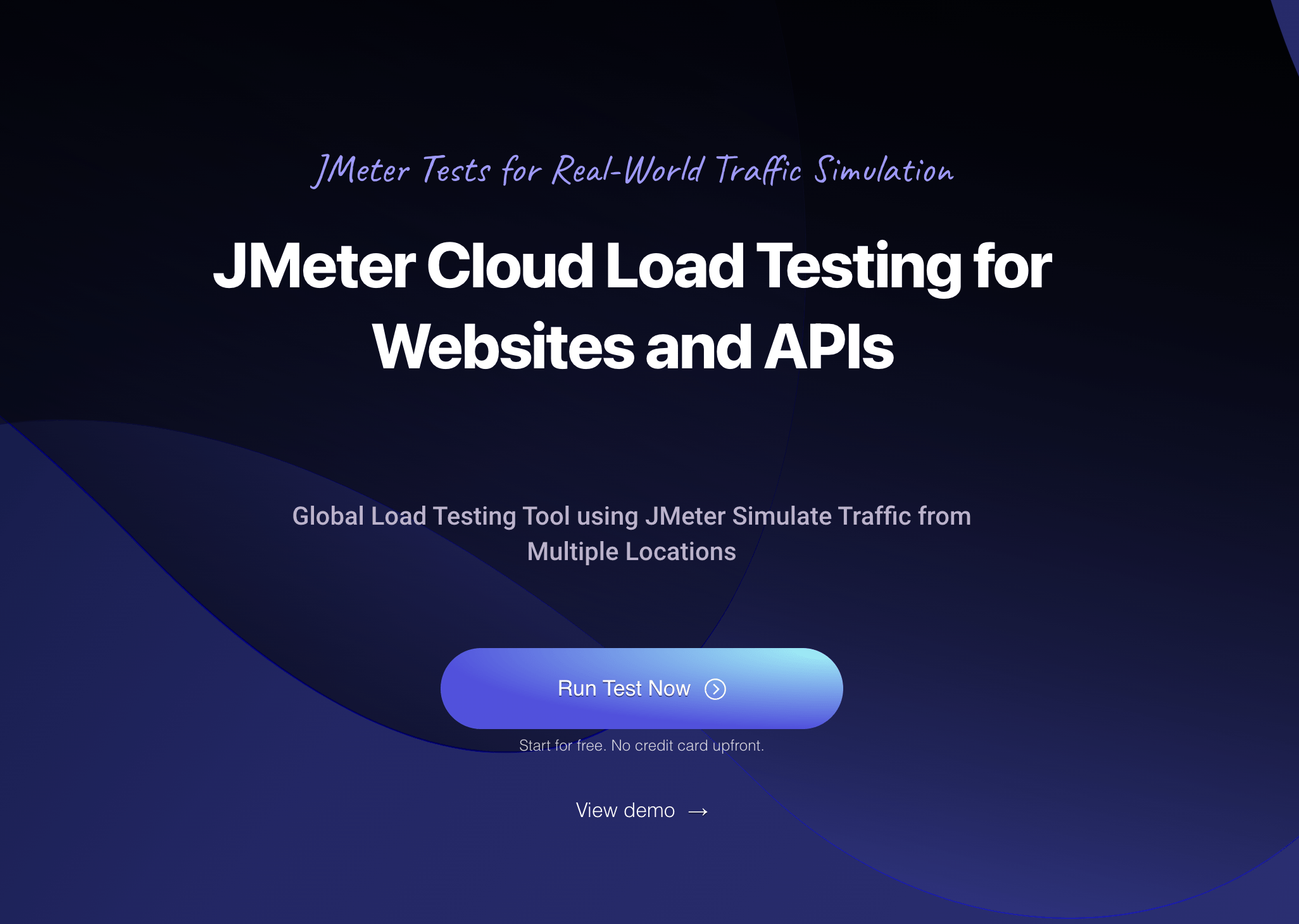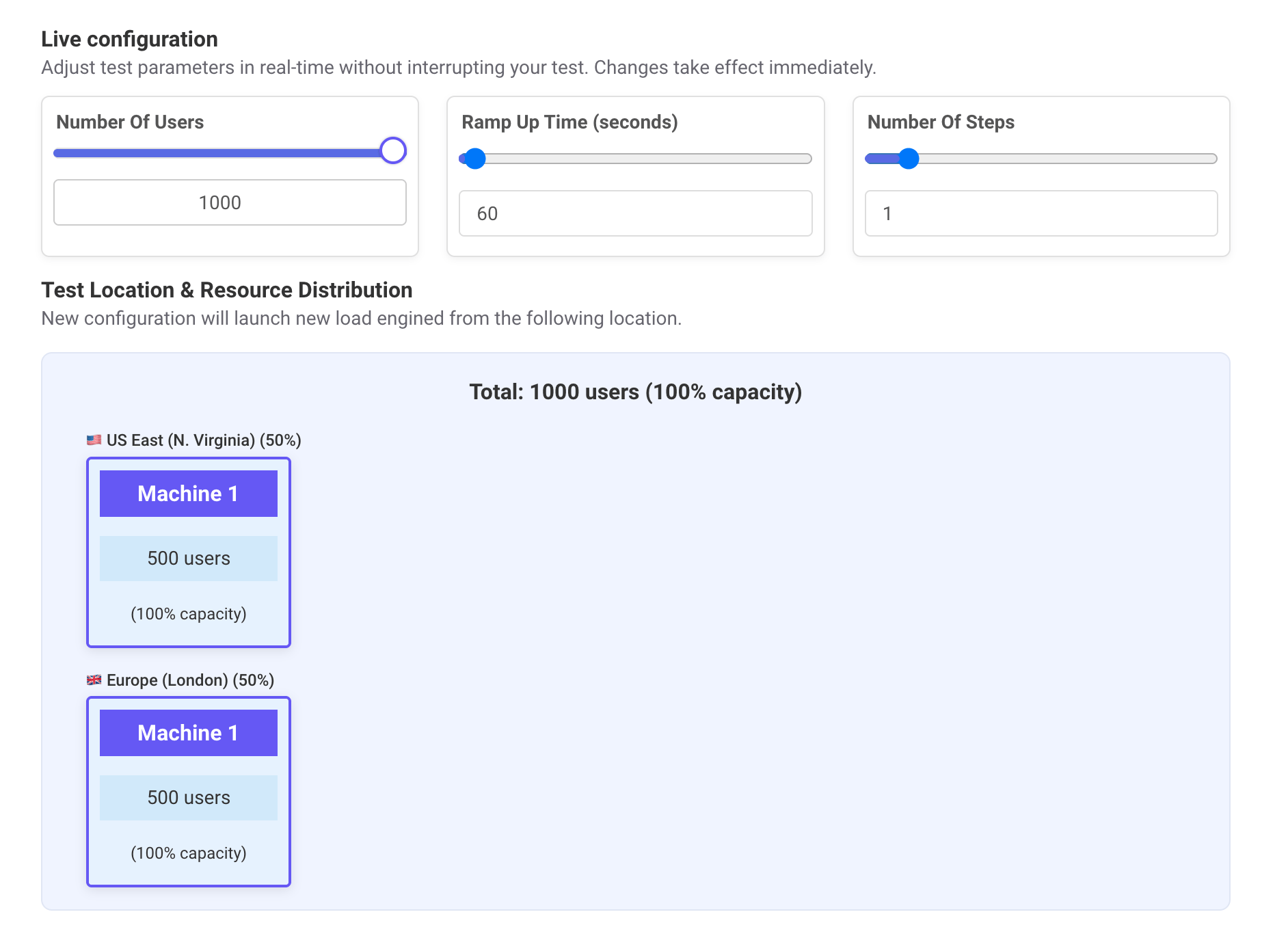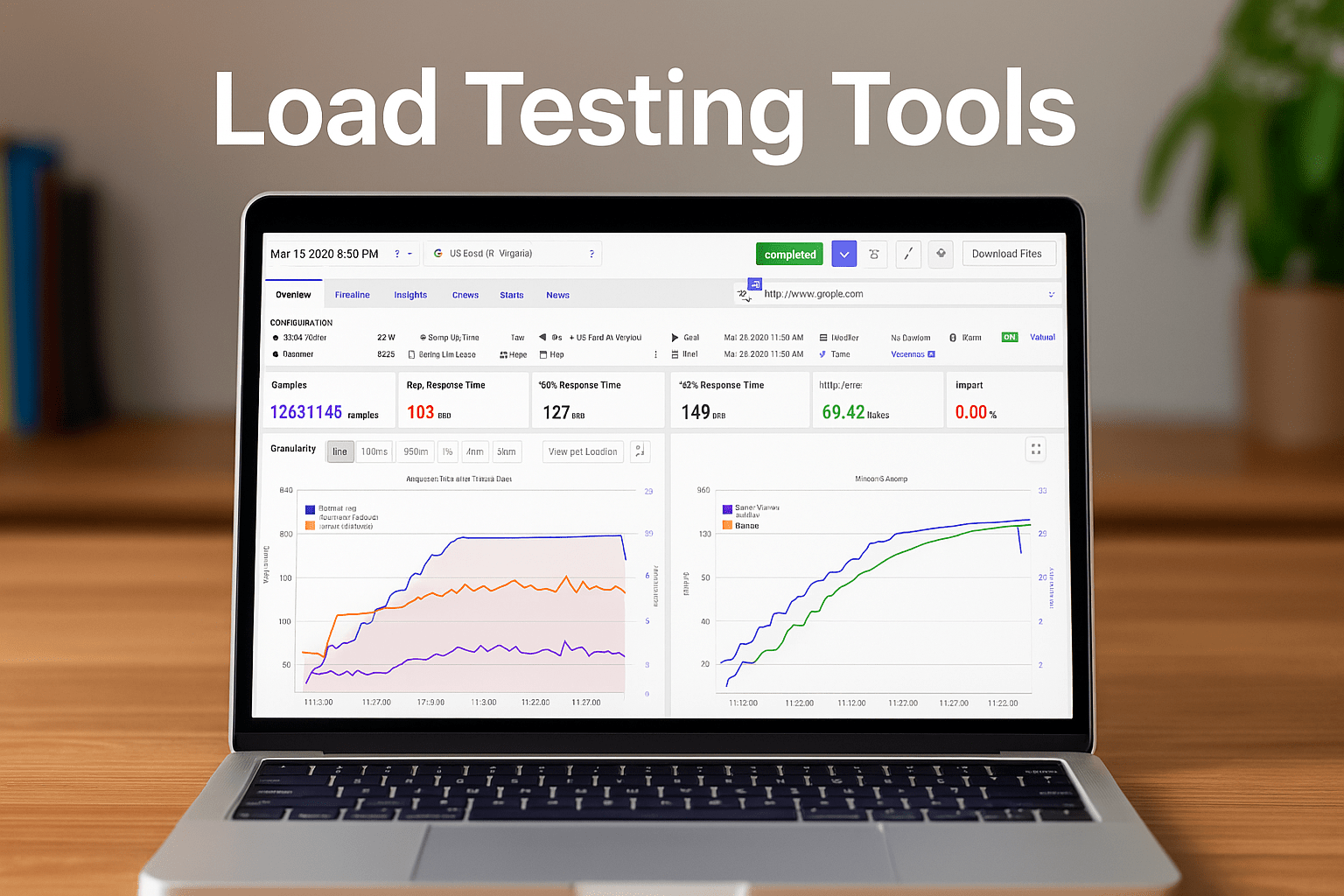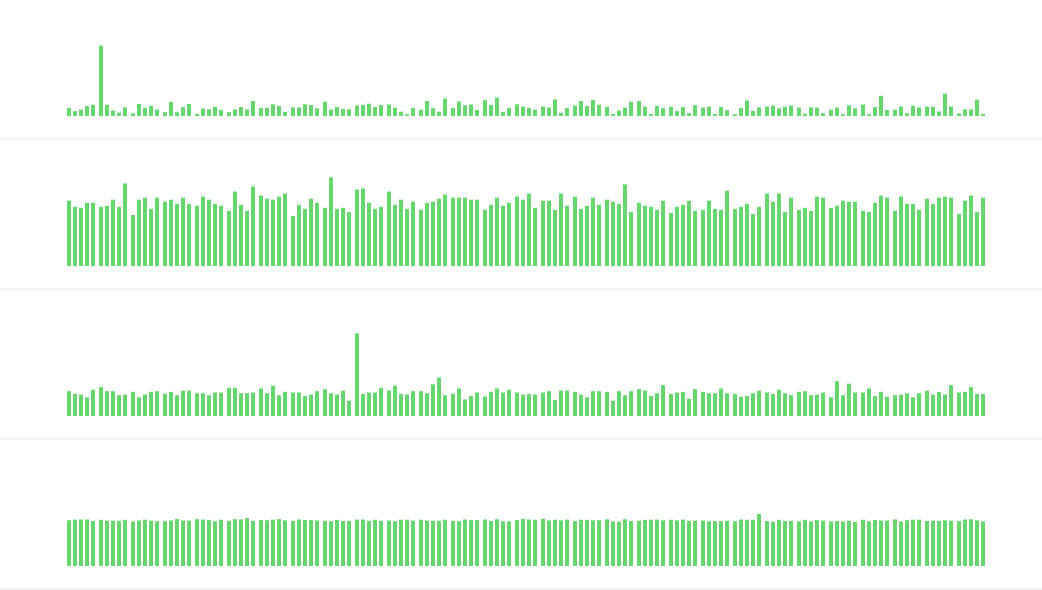JMeter continues to be a popular tool for performance and load testing in 2025, but there are a variety of other tools that enhance, complement, or provide alternatives to JMeter. In this article, we will explore the 10 best JMeter testing tools available this year, including three open-source options, and why these tools might be the best fit for your projects.
Overview of the Best JMeter Testing Tools for 2025
Here’s a quick overview of the top ten JMeter testing tools, along with links to their official websites, including three open-source options:
Is Your Infrastructure Ready for Global Traffic Spikes?
Unexpected load surges can disrupt your services. With LoadFocus’s cutting-edge Load Testing solutions, simulate real-world traffic from multiple global locations in a single test. Our advanced engine dynamically upscales and downscales virtual users in real time, delivering comprehensive reports that empower you to identify and resolve performance bottlenecks before they affect your users.
- LoadFocus – Modern Cloud Load Testing for Websites and APIs.
- BlazeMeter – For continuous testing and seamless integration with CI/CD pipelines.
- NeoLoad – Enterprise-grade load testing for large-scale applications.
- Gatling – Developer-friendly load testing with high performance.
- k6 – Scriptable load testing designed for modern web applications.
- Locust – Python-based, easy-to-use, and scalable load testing.
- LoadRunner – Comprehensive load testing with extensive protocol support.
- Artillery – Powerful and modern load testing with real-time reporting.
- StresStimulus – Easy-to-use load and performance testing for web applications.
- RedLine13 – Affordable cloud-based load testing with JMeter and Gatling integration.
Top Open-Source JMeter Testing Tools:
- Apache JMeter – The original open-source load testing tool, supporting multiple protocols.
- Taurus – Open-source test automation tool that simplifies running JMeter, Gatling, and Selenium tests.
- The Grinder – Java-based open-source load testing tool for distributed testing.
This overview includes both commercial and open-source options to give you a comprehensive view of the top JMeter testing tools available in 2025.
Best JMeter Testing Tools in 2025
1. LoadFocus – Cloud-Based JMeter Load Testing for Websites and APIs
LoadFocus provides cloud-based load testing built on top of JMeter for testing websites and APIs. It allows you to scale tests in the cloud and run multiple JMeter tests simultaneously, providing detailed insights and reports.
- Features:
- Cloud-based execution
- Real-time monitoring and reporting
- Supports various testing protocols
- Seamless integration with CI/CD tools
- Scalable to thousands of concurrent users

Think your website can handle a traffic spike?
Fair enough, but why leave it to chance? Uncover your website’s true limits with LoadFocus’s cloud-based Load Testing for Web Apps, Websites, and APIs. Avoid the risk of costly downtimes and missed opportunities—find out before your users do!
Newsflash: In a recent development, LoadFocus has unveiled an amazing and innovative real-time scaling module, setting a new trend in cloud-based load testing and reinforcing its position as a leader in the industry.

Get started with LoadFocus SSL Checker Tool to test your website’s SSL configuration.
2. BlazeMeter – Continuous Testing and CI/CD Integration
BlazeMeter is a SaaS-based performance testing tool that offers JMeter compatibility and a comprehensive testing platform. It’s ideal for those looking for continuous testing solutions that integrate well with CI/CD pipelines.
- Features:
- Scriptless test creation
- JMeter compatibility
- Real-time reporting and analytics
- Scalable performance testing for websites and APIs
3. NeoLoad – Enterprise-Grade Load Testing
NeoLoad provides enterprise-level performance testing for complex applications, including mobile, web, and APIs. It’s especially useful for large organizations needing detailed load testing across distributed environments.
- Features:
- Advanced reporting and analytics
- Load testing for mobile and IoT applications
- Collaboration features for team environments
- Continuous integration with CI/CD tools
4. Gatling – Developer-Centric Load Testing
Gatling is a high-performance load testing tool that offers a developer-friendly approach to performance testing. It’s particularly suited for testing web applications and APIs with scalability in mind.
LoadFocus is an all-in-one Cloud Testing Platform for Websites and APIs for Load Testing, Apache JMeter Load Testing, Page Speed Monitoring and API Monitoring!
- Features:
- Built with Scala for high performance
- Supports HTTP, WebSockets, and JMS protocols
- Comprehensive and customizable reports
5. k6 – Scriptable Load Testing for Modern Applications
k6 is a modern load testing tool with a focus on developers. It offers a scriptable interface using JavaScript, making it ideal for integrating performance testing into development workflows.
- Features:
- Scriptable tests using JavaScript
- Open-source and cloud versions
- Seamless CI/CD pipeline integration
6. Locust – Python-Based Load Testing
Locust is a scalable and easy-to-use load testing tool where users define behavior using Python code. It’s simple to set up and can simulate millions of users.
- Features:
- Web-based user interface
- Distributed testing support
- Python-based scripting
7. LoadRunner – Comprehensive Load Testing Solution
LoadRunner by Micro Focus offers extensive protocol support and load testing capabilities for web, mobile, and API testing. It’s highly adaptable and ideal for enterprise-level performance testing.
- Features:
- Supports over 50 protocols
- Advanced load testing and analysis
- Integrates with performance monitoring tools
8. Artillery – Powerful Modern Load Testing
Artillery is a performance and load testing tool that can handle modern testing scenarios, including serverless functions, APIs, and complex user flows.
- Features:
- Real-time performance reporting
- Flexible and lightweight
- Supports HTTP, WebSockets, and Socket.io
9. StresStimulus – Easy-to-Use Load and Performance Testing
StresStimulus provides performance and load testing with an easy-to-use interface. It’s designed for testing websites and web applications, with extensive reporting and diagnostics features.
- Features:
- Integration with Fiddler for HTTP debugging
- Scalable cloud load testing
- Real-time analytics and detailed reports
10. RedLine13 – Affordable Cloud-Based Load Testing
RedLine13 offers affordable load testing using cloud resources. It supports running JMeter, Gatling, and other open-source testing tools in the cloud.
- Features:
- Low-cost load testing
- Integrates with AWS for cloud scalability
- JMeter and Gatling compatibility
Top 3 Open-Source JMeter Testing Tools
1. Apache JMeter – The Original Open-Source Load Testing Tool
Apache JMeter is the original open-source load testing tool. It supports various testing protocols and can simulate a large number of users accessing a web application.
- Features:
- Free and open-source
- Protocol support for HTTP, FTP, WebSockets, and more
- Extensible with plugins
2. Taurus – Open-Source Test Automation Tool
Taurus is an open-source test automation tool that simplifies creating and running JMeter, Gatling, and Selenium tests. It uses YAML-based configuration for easy setup.
- Features:
- Supports multiple testing tools
- YAML-based test definition
- Integrates with Jenkins and other CI/CD tools
3. The Grinder – Java-Based Load Testing
The Grinder is a Java-based load testing framework that supports a wide range of testing protocols. It is designed for running distributed tests.
- Features:
- Open-source
- Java-based scripting
- Distributed load testing support
FAQs
What is a JMeter testing tool?
JMeter is an open-source performance testing tool used to test the load and performance of web applications, APIs, and other services. It simulates multiple users interacting with the system to evaluate its behavior under different conditions.
Is JMeter an API testing tool?
Yes, JMeter is commonly used for API testing. It supports a variety of protocols, including HTTP, HTTPS, and WebSockets, making it ideal for testing the performance and functionality of APIs.
Is JMeter a stress testing tool?
Yes, JMeter can be used for stress testing to determine how a system behaves under extreme load conditions. It helps identify bottlenecks and ensures that systems can handle peak traffic.
Is JMeter still used?
Yes, JMeter is widely used in 2025 for performance and load testing of web applications, APIs, databases, and other services. It remains one of the most popular tools for load testing due to its flexibility and extensive protocol support.
Is JMeter hard to learn?
JMeter has a bit of a learning curve, especially for beginners unfamiliar with performance testing concepts. However, it provides a graphical user interface (GUI) and extensive documentation, which helps ease the learning process.
Which is better, Selenium or JMeter?
Selenium and JMeter serve different purposes. Selenium is primarily used for automating browser-based functional testing, while JMeter is designed for load and performance testing. Both tools can complement each other in different stages of testing.
Does JMeter require coding?
JMeter does not necessarily require coding for basic performance tests, as it provides a GUI for building test plans. However, advanced users can extend JMeter’s functionality using scripting languages like Groovy and Java.
Is JMeter a good tool?
Yes, JMeter is a highly effective and reliable tool for performance and load testing. It is open-source, has extensive protocol support, and offers flexibility through plugins and integrations with other tools.
Which is better, JMeter or Postman?
JMeter and Postman serve different purposes. Postman is mainly used for functional API testing, while JMeter is more focused on performance and load testing. For API performance testing under load, JMeter is generally the better choice.



